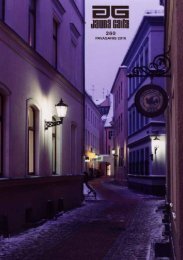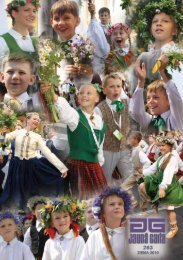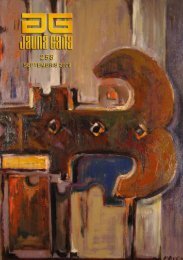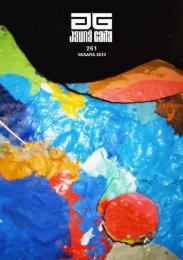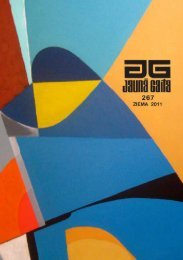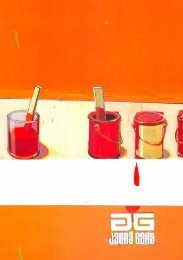Create successful ePaper yourself
Turn your PDF publications into a flip-book with our unique Google optimized e-Paper software.
IN THIS ISSUELETTERS AND CULTURE. Baiba Bičole presentsfive new poems of her own and introducesus to the poetry of her sonArvils Rumpēters, who, eight years ago, diedmuch too young. He wrote what she calls„Arvilisms” (his title is “Glimmers”): short ruminations/observationsjoyfully indulging inthe unique power and beauty of the Latvianlanguage. In two prose compositions,Laima Kalniņa meditates on the spiritualcost of war and exile. She recounts the lasttime she ever laughed (the full horror of warhad not yet overwhelmed her at her countryhome in Kurzeme or Courland). Thenshe tells of being tempted, in the spring of1945, to return home „for just a brief visit”,to cross the so-called Green Line markingthe not yet hardened border betweenSoviet-occupied and American-occupiedGer many. Irēne Avena reviews the proceedingsof a two-day conference in Rīga in October2006 on the impact of the work ofpoet Vizma Belševica (1931-2005) on Latvianliterature and Latvian history. As a stubborndissident to Soviet rule, Belševica daredthe Latvian people to see themselves forwhat they were becoming, to reject theirown impotence, self-betrayal, and cowardiceand to sense the existence of a paralleluniverse where they could hope to be morefully human again; like a „golden compass”,she gave voice to the conscience of her nation.Lidija Dombrovska tells a story of threeanonymous cryptic messages received overthe course of some years from a fan of hersin Latvia. And on the lighter side of the artof the written word is Uldis Siliņš’ parodyof a scene from Rainis’ epic verse dramaZelta zirgs (The Golden Steed).MUSIC. Mezzosoprano Elīna Garanča recentlyreceived rave reviews for her debut performancein The Barber of Seville at the MetropolitanOpera in New York, and for her October2007 performance in the title role of Bizet’sCarmen she here receives a no less enthusiasticreview in Helēna Gintere’s article aboutAndrejs Žagars’ production of that opera inRīga. Avant-garde composer Gundaris Pone(1932-1994) is not forgotten, asserts BirutaSūrmane, and as proof she reviews a jubileepublication about his life work put out byMūzikas Saule magazine.ART. Featured in this issue are color reproductionsof paintings (acrylics on cloth) byHaralds Norītis, well known to regular JGreaders, and by Laura Cīruls, introducedin an article by Anete Ivsiņa. Two enigmatic(albeit wonderfully realistic) drawings byEdgars Jēriņš (charcoal on paper) are alsofeatured. Art editor Voldemārs Avens writesabout a cross-generational exhibit of painting,sculpture and photography in Philadelphiasponsored by the Associationof American Latvian Artists (ALMA), andGundega Cēbere relates her impressions ofan exhibit of Laris Strunke’s art at the RoyalArt Academy in Stockholm, Sweden. Coverart is by Ilmārs Rumpēters.HISTORY. Franks Gordons illuminates his discussionof the Yearbook (2006) of the LatvianOccupation Museum (LOM) with insightfrom his own personal experiences shortlybefore World War II and under Soviet rulein Latvia. The seventh installment of RolfsEkmanis’ meticulously documented historyof international Latvian-language radiobroadcasting during the Cold War, bringsus to the years 1965-1972, when Free LatvianVoice (BLB) operated under the auspicesof the Russian exile organization NarodnoTrudovoi Soyuz (NTS) in Frankfurt, Germany.And the sixth installment of Dr. AlfredsTauriņš’ diary relates his day-to-day struggles,frustrations and triumphs as head ofthe Latvian committee at the Hochfeld refugeecamp in Augsburg, Germany, in Octoberand November of 1945.OPINION / CURRENT EVENTS. Valters Nollendorfs,founding editor of Jaunā Gaitaand currently Assistant Director of DevelopmentAffairs at the LOM tells of plans toexpand the museum. Tija Kārkle sets forth„Road Signs Toward a Latvian Soul and aLatvian Way of Life.” In Kiberkambaris, denizensof the long-lived Latvian-language listserve„Sveiks” discuss whether or not Latvia’spoliticians were playing an April foolsjoke on the public in their most recent incoherentattempts to grapple with the issueof citizenship rights. Aina Siksna in the Letterssection writes of a visit to an orphanagein Pskov, Russia. She is delighted to findthat it is situated on a street named for Latvianpoet Jānis Rainis. The Marginalia sectionpre sents a wide-ranging selection ofnews shorts concerning Latvian culture allover the world (and not only!). Books reviewedinclude Experiencing Totalitarianism,ed. Andrejs Plakans; the latest from LaimaMuktupāvela; Ieva Zole’s collected conversationswith theater director Māra Ķimele; anautobiography by moviemaker Jānis Streičs;Sven Birkerts’ Reading Life: Books for theAges; and the latest issue of the Journal ofBaltic Studies.J.Ž.



